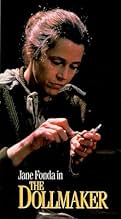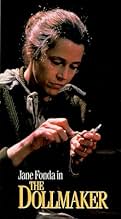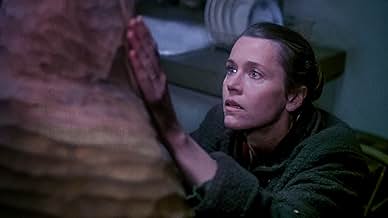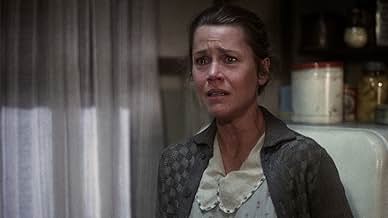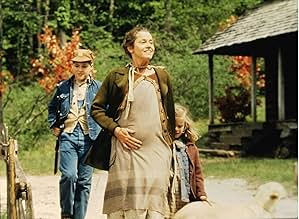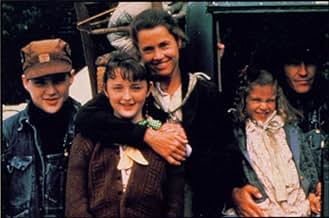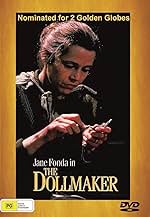NOTE IMDb
7,5/10
1,1 k
MA NOTE
Une mère doit quitter le Kentucky dans les années 30 avec ses enfants après que son mari eut accepté un job à Detroit au Michigan. Sa famille traverse des épreuves pénibles, mais elle trouve... Tout lireUne mère doit quitter le Kentucky dans les années 30 avec ses enfants après que son mari eut accepté un job à Detroit au Michigan. Sa famille traverse des épreuves pénibles, mais elle trouve la force nécessaire pour y survivre.Une mère doit quitter le Kentucky dans les années 30 avec ses enfants après que son mari eut accepté un job à Detroit au Michigan. Sa famille traverse des épreuves pénibles, mais elle trouve la force nécessaire pour y survivre.
- Réalisation
- Scénario
- Casting principal
- Récompensé par 2 Primetime Emmys
- 5 victoires et 7 nominations au total
Robert Swan
- Victor
- (as Bob Swan)
Avis à la une
This extremely powerful film features one of the strongest and best performances by Jane Fonda, as a Kentucky share-cropper's wife struggling during the years 1944-5 both to liberate herself as a person and save her family from devastating and terrible hardship, which means no money and nothing to eat (a problem compounded by having five children to feed). The film is thoroughly authentic and is a rare example of the shallow trendies of Hollywood getting to grips with real life and genuinely provincial people. Jane Fonda portrays a heroic young woman with irrepressible fire and vigour, a kind of "Kentucky Mother Courage', and as the film progresses and she improves her speech patterns, her Kentucky accent gets closer and closer to the real thing. That in itself is a remarkable achievement, considering how few actors can ever manage it. Fonda's husband is played by Levon Helm, a genuine hick born in Arkansas, whose first acting role was in THE COAL MINER'S DAUGHTER (1980), which was also set in Kentucky. Helm needed no coaching to 'talk country', as he was born to it. All he had to do was fine-tune his Arkansas accent and shift it slightly into Kentucky mode. This film is based upon a novel by Harriette Simpson Arnow (1908-1986), who was born in Kentucky and intimately knew what she was writing about (she had also lived in Detroit, which is portrayed in the latter part of the film). I wondered why the Kentucky scenes did not really look like Kentucky, but the end credits explained that those scenes were shot in Tennessee. The setting is meant to be the foothills of the Cumberland Mountains of Appalachia in Kentucky, but only a pernickety person like myself would notice the difference, and that there are too many rivers and not enough trees, and a severe shortage of very steep hills. The Michigan scenes were also shot in Illinois. Oh well, never mind, it all works anyway. The wonderfully accurate use of language and turns of phrase present in the script were presumably all taken word for word from the novel, and it is a joy to see and hear this record for posterity of a now-vanishing speech which was a direct survival of the 17th century language of England and Northern Ireland ('Ulster') amongst the Kentucky country folk who describe themselves as the 'Scotch-Irish' because they are descended from the Protestant Scots who settled in Ulster in Elizabethan and Stuart times, as I partly am myself, and as by far the majority of the American presidents have been (such as Abraham Lincoln and Andrew Johnson, to name but two, Lincoln being a distant relation of mine by marriage only, through his stepmother Johnston). One especially good aspect of this film is the casting of the children, all of whom were chosen very carefully and are excellent. (Hollywood casting of children is often so very puke-making, isn't it?) The TV film was directed by Daniel Petrie (1920-2004), who directed 91 films in his career, mostly for television, but whose best known feature films for the cinema were A RAISIN IN THE SUN (1961) with Sidney Poitier and FORT APACHE THE BRONX with Paul Newman (1981). For TV he made films about Truman, Roosevelt, and Nixon, thus carving a presidential niche for himself. He was a Canadian, and it is not known how he came to make such a sensitive film about Kentucky country folk as this, having presumably never had experience of them. He was clearly a man of greater talent than is customarily recognised. The story of this film is based upon a common problem faced by women throughout history, namely that they sometimes marry men stupider than themselves. That is always a bad idea, because the woman and her children are then at the mercy of bad decisions made by someone who is essentially a fool, but who insists upon exerting authority in the household because it is his right as a superior male, and he has the muscle to back it up. Fonda's husband means well but he is just not very bright, and early in the tale, she is still frozen in the mould of the dutiful wife, enforced by threats from her overbearing mother (played by Geraldine Page), who would rather die than defy her husband in any way whatever and who insists that it is Fonda's duty to 'love honour and obey', with the emphasis on the obey. So the husband, without telling his wife, sneaks off to Detroit to become a factory worker for Mr. Flint (yes, Mr. Flint of Flint, Michigan) and earn lots of money (or so he imagines). Fonda is forced by her mother to follow her husband to the appalling environment where he is now living in a paper-thin shack in a row of what are essentially workers' barracks, and where the good salaries they earn are soon wasted on the higher prices paid to live and frittered away on surviving the endless strikes, so that after a lengthy period of misery they end up with nothing after all. As things get grimmer, Fonda is increasingly forced to develop a bit more self-confidence and start taking the initiative herself. She has always had a knack for 'country whittling' with wood, a habit indulged in by most mountain folk in Kentucky in those days. But her talent is greater than most, and she is discovered by an arts and crafts teacher and enabled to sell her carvings, especially her animals and dolls (hence the title of the film), which finally earns them enough money to get ahead, while all the husband's efforts have dismally failed. I shall not relate the end of the story, as that is against IMDb rules, but I urge everyone to see this remarkable film. If only there were more like it, and less money were wasted on worthless, insipid cinematic trivia.
Jane Fonda plays a Kentucky hillbilly with five children who knows no reality besides the constant obedience to her husband in The Dollmaker. Take a moment to absorb that sentence. If you're shaking your head thinking she could never pull a role like that off, rent the TV-movie that won her an Emmy. She's practically unrecognizable in her transformation. Gone is the beautiful, strong woman who helped millions of women exercise, and in her place is a frumpy, useful homemaker who works herself to the bone every day to keep her family afloat.
The Dollmaker takes place during WWII, and when Jane's husband Levon Helm gets drafted, Jane thinks her life will begin again. She's been secretly saving money for years from whittling dolls out of scrap pieces of wood, hoping to buy a farm while her husband's fighting in the war. When he comes home, he'll see how the family's thrived on the farm and he won't question her decision. However, Levon doesn't get accepted by the army. Instead he gets a factory job in Detroit and demands his family join him. Jane's mother, Geraldine Page, pressures her to obey her husband, so Jane packs up her five children and her nest egg and moves to Detroit.
In her new life, Jane lives through unspeakable horrors. She gives such a heartfelt, harrowing performance, at times you'll forget she's Jane Fonda. This is a once-in-a-lifetime performance, and it truly takes you back in time to an era when women blindly obeyed their husbands. Modern feminists will probably feel betrayed that Jane took on such a role, but they might feel better if they look at The Dollmaker as a cautionary tale, which it absolutely is. It's an extremely heavy drama, and it might not be for everyone. But if you like terribly depressing stories by Tom Hardy or John Steinbeck, you'll be in a better place to appreciate this tragedy. Get out your Kleenexes and get ready for the best performance of Jane Fonda's career.
Kiddy warning: Obviously, you have control over your own children. However, due to some upsetting scenes involving children, I wouldn't let my kids watch it.
I haven't been able to find this movie available on DVD anywhere, so if you'd like to watch it, click here to watch it on YouTube. And thanks "astrosbaseball2012" for posting!
The Dollmaker takes place during WWII, and when Jane's husband Levon Helm gets drafted, Jane thinks her life will begin again. She's been secretly saving money for years from whittling dolls out of scrap pieces of wood, hoping to buy a farm while her husband's fighting in the war. When he comes home, he'll see how the family's thrived on the farm and he won't question her decision. However, Levon doesn't get accepted by the army. Instead he gets a factory job in Detroit and demands his family join him. Jane's mother, Geraldine Page, pressures her to obey her husband, so Jane packs up her five children and her nest egg and moves to Detroit.
In her new life, Jane lives through unspeakable horrors. She gives such a heartfelt, harrowing performance, at times you'll forget she's Jane Fonda. This is a once-in-a-lifetime performance, and it truly takes you back in time to an era when women blindly obeyed their husbands. Modern feminists will probably feel betrayed that Jane took on such a role, but they might feel better if they look at The Dollmaker as a cautionary tale, which it absolutely is. It's an extremely heavy drama, and it might not be for everyone. But if you like terribly depressing stories by Tom Hardy or John Steinbeck, you'll be in a better place to appreciate this tragedy. Get out your Kleenexes and get ready for the best performance of Jane Fonda's career.
Kiddy warning: Obviously, you have control over your own children. However, due to some upsetting scenes involving children, I wouldn't let my kids watch it.
I haven't been able to find this movie available on DVD anywhere, so if you'd like to watch it, click here to watch it on YouTube. And thanks "astrosbaseball2012" for posting!
10jrein39
This is an all time favorite of mine. A tear jerker, good story line. True to life drama, of the way things were, for the dirt poor. Not having enough money for medical and other expenses, moving to the city should make things better, but does it? Gertie puts her heart and soul into carving a piece of wood to try to get the peace she is seeking. And to get enough money to get her family back home. Out of the big city and back to the hills. This movie has the old time folk music which is great. You don't hear to many of them any more. Does anyone know if a sound track was made for this movie? I am looking for it with no success.
"The Dollmaker" deserves to be considered a classic. The story itself would be memorable and moving with or without Fonda, but her portrayal of Gertie Nevels, the mother, is very true to the type. There is no hint of the bumpkin in Fonda's interpretation of the uneducated, backwoods mother of five, who moves from the Kentucky hills to Detroit, where she and her family endure great hardships. Fonda plays the part of a strong Appalachian woman with dignity. Although "The Dollmaker" has not been picked up and replayed as one of the "modern classics," it truly deserves a place alongside other classics, such as "To Kill a Mockingbird" and "Coal Miner's Daughter." It has been quite a few years since I saw the film--probably at the time of its original release in 1984--but it touched me deeply enough that I have never forgotten it.
This movie is an undiscovered gem: a simple, beautiful story of a woman struggling with poverty and other obstacles in her life. Jane Fonda creates a picture of an Appalachian woman who is complex, brave, and at times resigned to the limitations of her life. This movie is unique in its straightforward presentation of a story about poverty that never swerves into sentimentality or condescension: ultimately it celebrates the strength, faith, and ingenuity of Gertie. Had this movie been released as a feature film it probably would have gotten more attention and be praised along side movies like "The Grapes of Wrath," which coincidentally was one of Jane Fonda's father's most memorable roles.
Le saviez-vous
- AnecdotesMovie stars Jessica Lange, Sissy Spacek and Jane Fonda were all in 1985 invited to testify before the House Democrats' Farm Task Force dealing with the emotional toll of the financial stress experienced by farmers in the early 1980's. The three actresses were invited to this Capitol Hill meeting due to their lead film performances as troubled farmers from each of their then current farm films from that era. The pictures were, respectively, Country - Les moissons de la colère (1984), La rivière (1984) and Les poupées de l'espoir (1984). Another farming picture at this time was Les saisons du coeur (1984) which starred Sally Field but she did not attend the hearings.
- ConnexionsFeatured in The 36th Annual Primetime Emmy Awards (1984)
Meilleurs choix
Connectez-vous pour évaluer et suivre la liste de favoris afin de recevoir des recommandations personnalisées
Détails
- Date de sortie
- Pays d’origine
- Langue
- Aussi connu sous le nom de
- The Dollmaker
- Lieux de tournage
- Sociétés de production
- Voir plus de crédits d'entreprise sur IMDbPro
Contribuer à cette page
Suggérer une modification ou ajouter du contenu manquant

